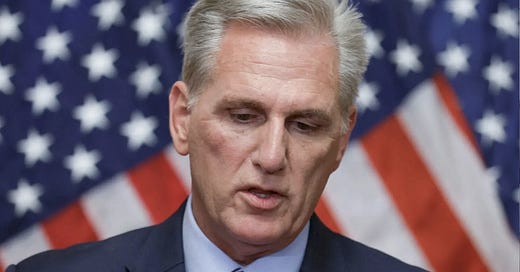Let's disempower the Speaker of the House
The state of Nebraska has a better way.
The recent furor surrounding the ousting of Republican Speaker of the House Kevin McCarthy ignores a far more fundamental question:
Do we even need a Speaker of the House as it currently exists?
In my previous post, I outlined why I think that the inherent centralization and unrepresentativeness of the position of Speaker of the House is misguided. In this post, I will outline a proven alternative.
The following is an excerpt from my second book Promoting Progress: A Radical New Agenda to Create Abundance for All. You can order e-books at a discounted price at my website, or you can purchase full-price ebooks, paperback, or hardcovers on Amazon.
Other books in my “From Poverty to Progress” book series:
Before presenting my alternative, however, I want to make sure that readers understand what actual powers of the Speaker and other partisan leaders in Congress have. While there are many powers, the most relevant are:
To establish the legislative agenda for the House. Currently, virtually all substantive legislative business must be approved by the Senate Majority Leader, the Speaker of the House, the House Majority Leaders, and their Whips.
To assign Congresspersons to committees. This has a powerful role in determining the substance of legislation that comes up for a vote.
Together, these two powers enable the Speaker (and to a lesser extent the Senate Majority Leader) a tremendous amount of power over Congress. Any Congressperson who defies this power is shunted to the sidelines, despite the fact that they were elected by their constituents.
I believe that the position of Speaker of the House and all other partisan leaders of Congress empowers a small minority of voters who do not represent the views of the American people. It is time to reform the entire process.
Departisanizing Legislative Leadership
I propose replacing partisan legislative leadership positions at the federal and state levels with non-partisan committees representative of the entire chamber. Each of the members of those committees will be elected members of the House and Senate from both parties. This will effectively create a collective leadership that represents the entire chamber.
This may seem a bit “pie-in-the-sky”, but we already have a model for how it might work: the Nebraska state legislature. The Nebraska state legislature is the only non-partisan legislature in the United States, and it has found a way to deliver results without party leaders.
My proposal takes the two major powers of the partisan leaders in Congress and transfers them to non-partisan committees that represent the entire Congress (not just the majority of the majority party):
Abolish all partisan leadership positions, including Majority Leader, Minority Leader, and Whips.
Elect Speakers via secret ballot and ranked-choice voting. This will make the Speaker representative of the entire legislature, not just the majority of the majority party.
Shift the power to set the legislative agenda to an Executive Board elected by all members of the chamber via secret ballot and ranked-choice voting. Each of the members will be elected members of the House and Senate from both parties.
Shift the power to set committed assignments to a Committee of Committees elected by a similar means.
Members of those two committees may only serve one two-year term every 10 years. Nor may they serve on any other committee. This will limit their ability to hoard power over time.
The vast majority of policy negotiations will be shifted back to the committees (as they were before 1970).
If you are interested in more details on my proposal, see the Appendix of my new book Promoting Progress: A Radical New Agenda to Create Abundance for All.
Our current leadership system gives power to the majority of the majority party, virtually all of whom are elected by low-turnout primaries and non-competitive general elections. Now, if combined with my other proposed reforms, Independents and moderates within each party would be empowered. And because of my other proposed reforms, those two groups would be far bigger than they are currently.
The combination of Independents, potential third parties, Democrats from Red states, and Republicans from Blue states would form a significant bloc in Congress. With such a bloc in the center, less partisan centrists would have a real chance of getting elected to governing committees.
Because those bipartisan committees would control the legislative agenda and committee assignments, this change would ripple through the entire institution. Whereas our current system empowers ideologues from non-competitive Blue/Red states, the new system would empower those who are willing to create centrist majorities on each issue. Non-elected bureaucrats would have to shift their stances to maintain Congressional funding.
Stay tuned for more excerpts!
The above was an excerpt from my second book Promoting Progress: A Radical New Agenda to Create Abundance for All. You can order e-books at a discounted price at my website, or you can purchase full-price ebooks, paperback, or hardcovers on Amazon.
Other books in my “From Poverty to Progress” book series:






